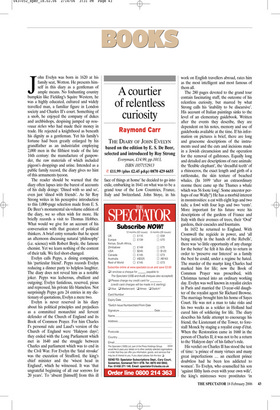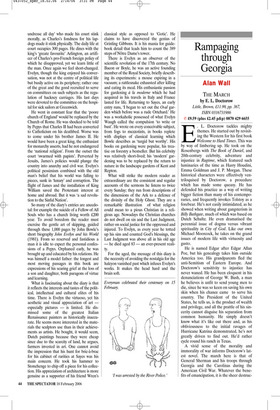A courtier of relentless curiosity
Raymond Carr
THE DIARY OF JOHN EVELYN based on the edition by E. S. De Beer, selected and introduced by Roy Strong Everyman, £14.99, pp.1013, ISBN 1857152913 V £11.99 (plus £2.45 p&p) 0870 429 6655 John Evelyn was born in 1620 at his family seat, Wotton. He presents himself in this diary as a gentleman of ample means. No foxhunting country bumpkin like Fielding’s Squire Western, he was a highly educated, cultured and widely travelled man, a familiar figure in London society and Charles II’s court. Something of a snob, he enjoyed the company of dukes and archbishops, despising jumped up nouveaux riches who had made their money in trade. He rejected a knighthood as beneath his dignity as a gentleman. Yet his family’s fortune had been greatly enlarged by his grandfather as an industrialist employing 2,000 men in the filthiest trade of the late 16th century: the manufacture of gunpowder, the raw materials of which included pigeon’s droppings and urine. Intended as a public family record, the diary gives no hint of this armaments tycoon.
The reader should be warned that the diary often lapses into the barest of accounts of his daily doings: ‘Dined with so and so’, even just ‘dined with friends’. As Sir Roy Strong writes in his perceptive introduction to this 1,000-page selection made from E. S. De Beer’s monumental six-volume edition of the diary, we so often wish for more. He briefly records a visit to Thomas Hobbes. What would we give for an account of his conversation with that greatest of political thinkers. A brief entry remarks that he spent an afternoon discussing natural ‘philosophy’ (i.e. science) with Robert Boyle, the famous chemist. Yet we learn nothing of the content of their talk. We feel short-changed.
Evelyn calls Pepys, a dining companion, his ‘particular friend’. Pepys records Evelyn reducing a dinner party to helpless laughter. The diary does not reveal him as a notable joker. Pepys was lecherous, ebullient and outgoing; Evelyn fastidious, reserved, pious and repressed, his private life blameless. Not surprisingly Pepys gets 24 entries in my dictionary of quotations, Evelyn a mere two.
Evelyn is never reserved in his diary about his political principles and prejudices as a committed monarchist and fervent defender of the Church of England and its Book of Common Prayer. For him Charles I’s personal rule and Laud’s version of the Church of England were ‘Halcyon days’; they ended with the Long Parliament which met in 1640 and the struggle between Charles and parliament which was to end in the Civil War. For Evelyn the ‘fatal stroake’ was the execution of Strafford, the king’s chief minister and the ‘wisest head in England’, which he witnessed. It was ‘that ungrateful beginning of all our sorrows for 20 years’. To ‘absent [himself] from this ill face of things at home’ he decided to go into exile, embarking in 1641 on what was to be a grand tour of the Low Countries, France, Italy and Switzerland. John Stoye, in his work on English travellers abroad, rates him as the most intelligent and most famous of them all.
The 280 pages devoted to the grand tour contain fascinating stuff, the outcome of his relentless curiosity, but marred by what Strong calls his ‘inability to be discursive’. His account of Italian paintings sinks to the level of an elementary guidebook. Written after the events they describe, they are dependent on his notes, memory and use of guidebooks available at the time. If his information on pictures is brief, there are long and gruesome descriptions of the instruments used and the cuts and incisions made in a Jewish circumcision and the operation for the removal of gallstones. Equally long and detailed are descriptions of rare animals: the ‘flexible elephant’, the ‘dreadful teeth’ of a rhinoceros, the exact length and girth of a rattlesnake, the skin texture of beached whales. (In 1699 ‘after an extraordinary storme there came up the Thames a whale which was 56 foote long’. Some ancestor perhaps of our Wally?) He has a morbid interest in monstrosities: a cat with eight legs and two tails; a fowl with four legs and two ‘vents’. More important for his future were his descriptions of the gardens of France and Italy with their avenues of trees, their ‘Oval’ gardens, their cascades and fountains.
In 1652 he returned to England. With Cromwell the regicide in power, and ‘all being intirely in the hands of the Rebells’, there was ‘so little opportunity of any change for the better’ he felt it his duty to return in order to ‘preserve our Interest’ as a family the best he could, under a regime he hated. The murder of the martyr king Charles had marked him for life; now the Book of Common Prayer was proscribed, with Christmas turned into an ordinary working day. Evelyn was well known in royalist circles in Paris and married the 13-year-old daughter of the royalist agent Sir Richard Browne. The marriage brought him his home of Sayes Court. He was not a man to take risks and his two weeks as a soldier in Holland had cured him of soldiering for life. The diary describes his futile attempt to encourage his friend, the Lieutenant of the Tower, to forestall Monck by staging a royalist coup d’état. When the Restoration came in 1660 in the person of Charles II, it was not to be a return to the ‘Halcyon days’ of his father’s rule.
His verdict on Charles II has stood the test of time: ‘a prince of many virtues and many great imperfections ... an excellent prince doubtless had he been less addicted to women’. To Evelyn, who counselled his son ‘against filthy lusts even with your own wife’, the king’s mistresses were prostitutes ‘in undresse all day’ who made his court stink morally, as Charles’s fondness for his lapdogs made it stink physically. The daily life at court occupies 300 pages. He dines with the king’s ‘greate favourite’ Arlington, an artificer of Charles’s pro-French foreign policy of which he disapproved, yet we learn little of the man. Once again we feel short-changed. Evelyn, though the king enjoyed his conversation, was not at the centre of political life but busily active on its periphery; rather one of the great and the good recruited to serve on committees on such subjects as the regulation of hackney carriages. His last days were devoted to the committee on the hospital for sick sailors at Greenwich.
He went in constant fear that the ‘poore church of England’ would be replaced by the Church of Rome. He was shocked to be told by Pepys that Charles II had been converted to Catholicism on his deathbed. Worse was to come under his brother James II. He would have been a great king, the enthusiast for monarchy asserts, had he not endangered the ‘national religion’. From the outset the court ‘swarmed with papists’. Perverted by Jesuits, James’s policies would plunge the country into anarchy and civil war. Evelyn’s political pessimism combined with the old man’s belief that his world was falling to pieces, sunk in ‘luxury’ and corruption. The flight of James and the installation of King William saved the Protestant interest at home and abroad. But it was ‘a sad revolution to the Sinful Nation’.
So many of the diary’s entries are anecdotal: for example the suicide of a Fellow of All Souls who has a church living worth £200 year. To avoid boredom the reader must exercise the gentle art of skipping, guided through these 1,000 pages by John Bowle’s short biography John Evelyn and his World (1981). From so reserved and fastidious a man it is idle to expect the personal confessions of a Pepys. Orphaned early, he was brought up and educated by his relations. He was himself a model father: the longest and most moving passages in this book are expressions of his searing grief at the loss of a son and daughter, both paragons of virtue and learning.
What is fascinating about the diary is that it reflects the interests and tastes of the political, intellectual and cultural elites of his time. There is Evelyn the virtuoso, yet his aesthetic and visual appreciation of art especially pictures — is limited. He dismissed some of the greatest Italian Renaissance painters as historically inaccurate. He seems more interested in the materials the sculptors use than in their achievements as artists. He bought, it would seem, Dutch paintings because they were cheap since due to the scarcity of land, he argues, farmers invested in art. One cannot avoid the impression that his hunt for bric-à-brac for his cabinet of rarities at Sayes was his main concern. He took his hammer to Stonehenge to chip off a piece for his collection. His appreciation of architecture is more genuine as a supporter of his friend Wren’s classical style as opposed to ‘Gotic’. He claims to have discovered the genius of Grinling Gibbons. It is his mania for guidebook detail that leads him to count the 389 steps of Nôtre Dame’s tower.
There is Evelyn as an observer of the scientific revolution of the 17th century. No Bacon or Boyle, he was an active founding member of the Royal Society, briefly describing its experiments: a mouse expiring in a vacuum; a rattlesnake exhausted after killing and eating its meal. His enthusiastic passion for gardening à la moderne which he had acquired in his travels in Italy and France lasted for life. Returning to Sayes, an early entry runs, ‘I began to set out the Oval garden which before was a rude Ortchard.’ He was a workaholic possessed of what Evelyn Waugh called the compulsion ‘to write or bust’. He wrote on every conceivable subject, from fogs to mezzotints, in books replete with displays of classical learning which Bowle describes as ‘turgid but worthy’. His books on gardening were popular, his treatise on forestry a bestseller. But his celebrity was relatively short-lived; his ‘modern’ gardening was to be replaced by the return to nature in the landscape gardens of Kent and Repton.
What will strike the modern reader as extraordinary are the consistent and regular accounts of the sermons he listens to twice every Sunday; they run from descriptions of the dimensions of the Ark to a defence of the divinity of the Holy Ghost. They are a remarkable illustration of what religion could mean to a pious Christian in a religious age. Nowadays the Christian churches do not dwell on sin and the Last Judgment, rather on social justice for the oppressed and injured. To Evelyn, as every year he totted up his sins and counted God’s blessings, the Last Judgment was above all in his old age — he died aged 83 — an ever-present reality.
For the aged, the message of this diary is the necessity of avoiding the nostalgia for the halcyon vanished past which infuses Evelyn’s works. It makes the head hard and the brain soft.



















































































 Previous page
Previous page